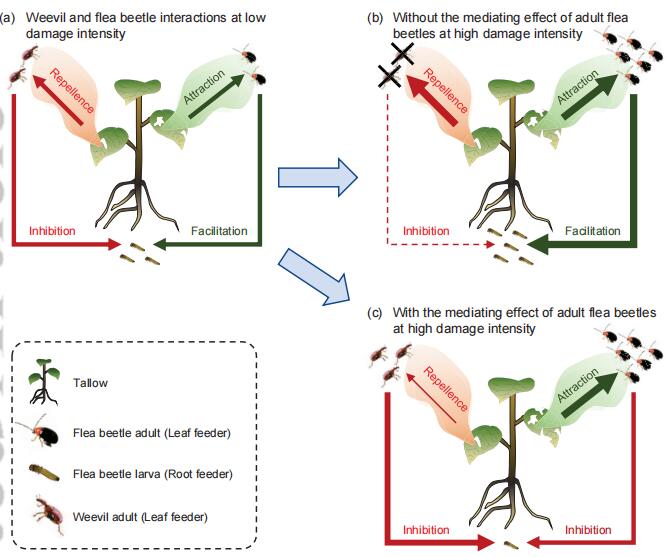Name:Wei Huang
Tell:
Email:huangwei0519@wbgcas.cn
Organization:Wuhan Botanical Garden
Herbivore Identity and Density Interacts to Determine Plant-mediated Interactions between Herbivores
2022-04-06
Plants are often exposed to multiple herbivores and densities of these attackers often fluctuate greatly in the field. Herbivore identity and density are known to be two major drivers of plant-mediated interactions among herbivores, but their combined effects are poorly understood.
The Invasive Ecology Group from Wuhan Botanical Garden addressed this research gap using Triadica sebifera (tallow), an aggressive woody invader, and two potential biological control agents, Bikasha collaris (flea beetle) and Heterapoderopsis bicallosicollis (weevil). Researchers investigated how variations in the intensity of leaf damage caused by flea beetle or weevil adults affected the performance of root-feeding flea beetle larvae through manipulation of the density of these two adult herbivores.
They find that weevil leaf damage decreases larval flea beetle survival with increasing leaf damage intensities. In contrast, herbivory by adult flea beetles facilitates larval survival at lower feeding intensity, and an effect that is reversed at higher feeding intensity. Furthermore, chemical analysis shows that root primary and secondary metabolism might underlie the observed effects on flea beetle larvae.
This study shows that herbivore identity and density interacts to determine systemic plant responses and plant-mediated interactions between herbivores. In particular, plant-mediated effects on herbivore are species- specific at low initial herbivore densities, but converge at high herbivore densities, which is likely to be a common phenomenon among herbivores feeding on the same host plant.
This study highlights the consideration of combined effects of herbivore identity and density when identifying factors influencing induced plant responses to herbivory and plant-mediated effects. It will help us further understand the mechanisms that shape the organization and diversity of herbivore communities, providing a new perspective on the improvement of biological control efficiency in future.
This work was funded by the National Natural Science Foundation of China, the Natural Science Foundation of Hubei Province and Application Foundation Frontier Project of Wuhan. Results have been published on Ecology entitled “Species-specific plant- mediated effects between herbivores converge at high damage intensity”

Conceptual models depicting how species-specific induced responses and ecological consequences depend on damage intensity in system of tallow (Triadica sebifera) that is attacked by above ground flea beetle adults (Bikasha collaris) and weevil adults (Heterapoderopsis bicallosicollis) as well by below ground flea beetle larvae (Image by WBG)